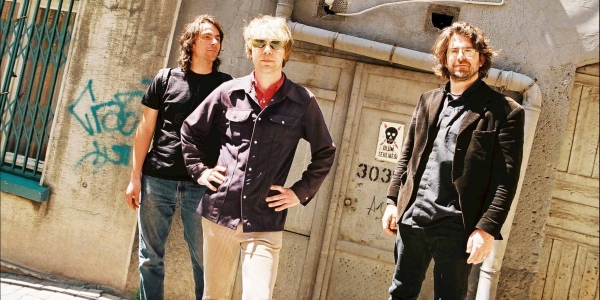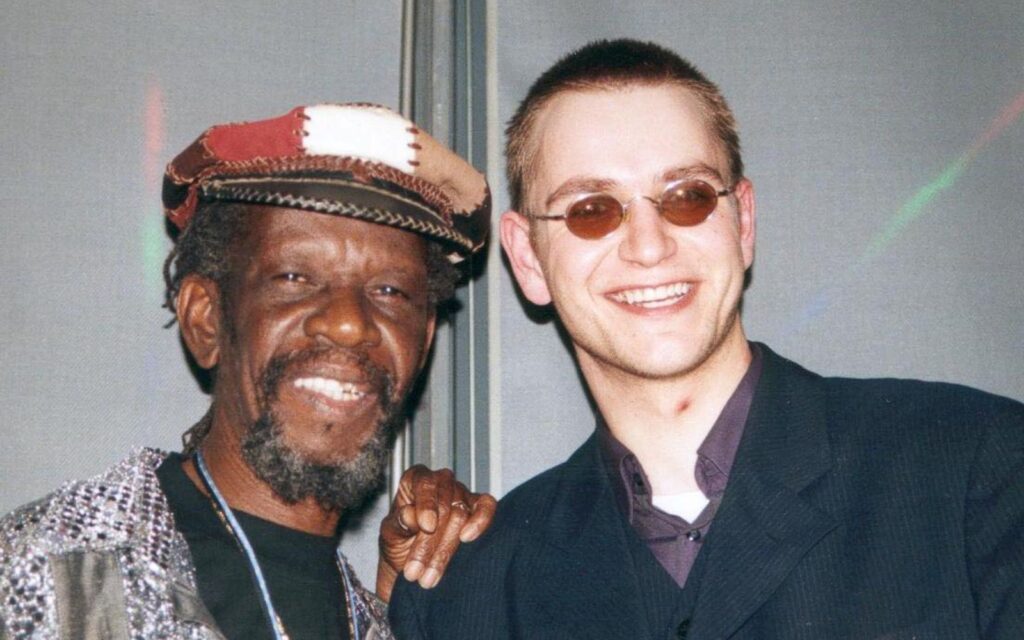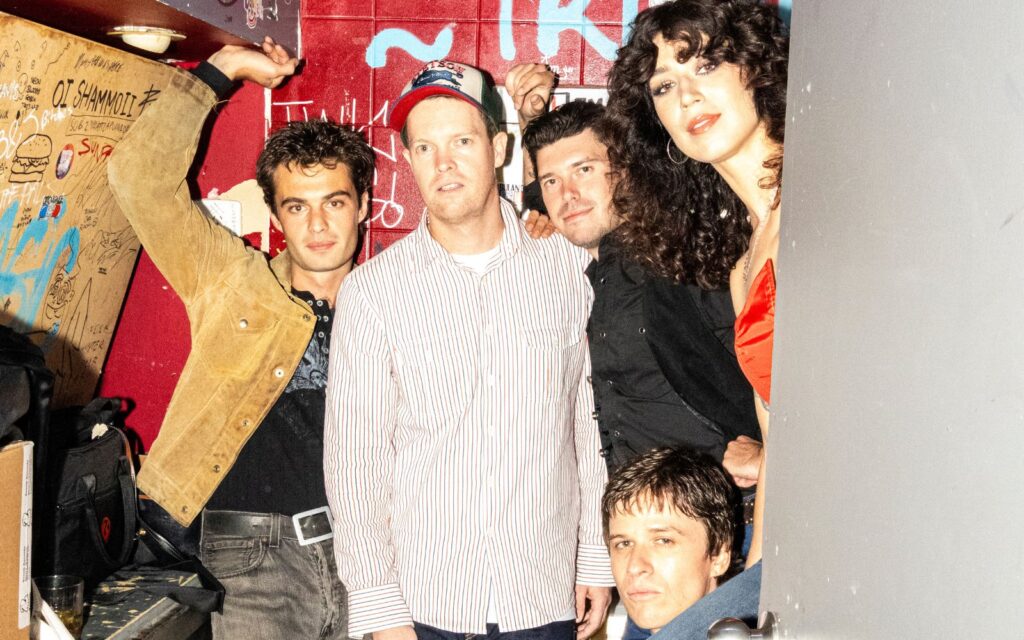“Three years,” she sighs, before laughing. “I can’t believe it took so long.”
Tambourine follows Teeth & Tongue’s much-admired debut, Monobasic, itself a work of alien intrigue, but one that only hinted at Tambourine’s fully-fledged maturity and poise.
The second imagining of Teeth & Tongue, crucially, comes after three years of upheaval for Cornelius – in the middle of the process of figuring out the direction the band would go in, her long-term relationship fell apart, which also meant another rearranging of the entire band.
It also, in turn, led to Cornelius coming to the realisation – after travelling around Europe on “basically a backpacking tour” – that she wanted to record an album based primarily on the use of drum machines. But it was the long gestation of Tambourine that allowed Cornelius to examine exactly how she wanted the album to sound, and what she wanted it to represent as a record.
“Some of the songs are old – like Vaseline On the Lens was written even before Monobasic came out – and one of them was written all the way up to the end of recording Tambourine. So I wasn’t like I spent three years writing this album, it was spent writing all these songs, of which only ten ended up on the record – a lot didn’t. So it spans this really long time, during which a lot happened.”
Which brings up the idea of, in having such an extended time period in which the album was recorded, Cornelius surely would’ve noticed her ideas and approaches to music shift in some subtle and some not-so subtle ways. In essence, the album almost could become a time capsule of personal evolution and change.
“Yeah, it’s interesting to see that happen,” she admits. “You see songs change, and the way you want them to sound change, reflecting what you’re doing and going through. I changed some of the lyrics across that time, obviously, and sonically, others went through these big changes as we reworked them.”
It would also make for an interesting way of being able to hone one’s skills as a songwriter, not having to rush writing and being able to muse over pieces for longer than usual. “Some songs I was taking out whole sections and dropping in other parts a year and a half after they were first written. There were some parts we played a four-piece, you know, the whole ‘rock’ band, that I eventually chopped up… it ended up almost as a collage.
“Because I had such a clear idea overall of the sounds I wanted on the album, I’d gone so far from when I first wrote them that they needed to be re-worked. It didn’t really stop until we started mixing, really.”
“It was a strange process,” she grins.
Rewinding to Monobasic, it was Cornelius’ hefty zeal for writing that led to a number of marked shifts in the way the band was composed. “It’s gone through so many changes that we had to just work out how to play this album live. We got some new people together, and by the time I started working on Tambourine properly, it was really just me and Marc (long-time collaborator Marc Regueiro -McKelvie),” she explains.
“It was mostly me just going in and tracking and laying things down,” she says of the process leading into Tambourine. “But Marc has his own special place, where I’d write a song, give it to him and he’d write his part, and they’d become integral parts of the song that I couldn’t imagine not being there. With the band thing, it’s a funny one, because before it imploded a year and a half ago, we were starting to write a bit more collaboratively.”
Ah. Yes. The band imploding. Something of a turning point for the album, one would assume. That version of the band went the way of the dodo and our assumptions of what constitutes the average household income “Because my boyfriend was in the band…” Cornelius explains.
“We broke up, which doesn’t really help the band situation,” she chuckles darkly. “So he wasn’t interested in playing on the album, and Steve (dummer Steve Masterson) was busy with New War and doing other things – that was more of mutual thing… I always wanted to do a drum machine album, and with the band demos, I just wasn’t feeling it, I knew we wouldn’t have released any of them; I knew I didn’t want to make a rock album. I just had this realisation of ‘I’m going down the wrong path here, I’m not going to get the sound I want’.”
With her band having shuffled out of the picture, it marked a definite change in the way Cornelius approached writing the album. That’d be the Kanye West moment, then? “Pretty much. As the band wasn’t really existing, I started doing all these solo shows, or duo shows with drum machines and Marc or whatever. Then I went to Europe playing just with guitar and drum machine live, and I realised that that was what I wanted to do.”
Writing for Tambourine took on a slightly different hue from there. Seemingly with the sound firmly in place in Cornelius’ mind, it was the lyrics from three years worth of writing that had to sit within the album’s framework.
“It talks about all sorts of stuff, but a lot of it does have to do with relationships and them falling apart,” Cornelius admits, “not just romantic ones either. I don’t think there’s a definite lyrical theme,” she muses, “there’s definitely no concept behind it lyrically – but lyrics can sometimes be hard work, sometimes they can be easy; they come from just little bits of inspiration. Like Unfamiliar Skirts came all in one night: lyrics, music, everything and I recorded it. It was just like, ‘bang’. I think I ended up using some of the vocals and bass line that I recorded that night,” she grins. “But others are a hard slog.
“I steeled myself for what other people’s response to it might be,” she adds. “You personally lose all perspective because you’re so close to it. Up to a point you almost have to detach yourself from what they’re saying, they’re totally sincere when you write them, but then other people might construe them a certain way.”
That brings up the reaction to, and reading of, female artists in music, in Australia especially, that is seemingly slowly but surely becoming one of a more equal environment. There remain critical and appraising limitations to be sure, but as more acts such as Teeth & Tongue, Kimbra, Washington, Stonefield and an increasing cast of others defy convention, the parochial idea of comparing female artists to one another seems less and less obvious.
“Comparisons…” muses Cornelius. “It’s nice; I’ve not been getting nearly as many on this one, which is great. I had such a strong vision for the album; the way I wanted the drums to sound like, the guitars, the bass to sound like; I just had a clearer idea of the record. The first one ( Monobasic) people would mention what they thought it sounded like – ‘it sounds like this’, ‘it sounds like that’ – even if I’d never listened to what they were referencing. This time hopefully there’s a little more of just ‘me’ on there, rather than anything else.”
As for the way female artists aren’t seemingly always automatically compared to one another, “I think that’s happening a little bit more,” Cornelius ponders. “It did annoy me a lot more at the start, but now I realise that it’s something that some people just need to do.”
It also helps that Teeth & Tongue have a stridently unique sound and a strong persona in Cornelius to push them above and beyond mundane and lazy comparisons. The sound of Tambourine remains its most striking feature, one that Cornelius crafted with producer Simon Grounds (Kes Band, Bird Blobs), a process that was as tough as it was inspiring, according to the songwriter. “It was intense sometimes, as we’ve both got our foibles – he’s quite eccentric and I can be… quite… moody to say the least,” Cornelius laughs.
But the toughest part was surrendering the idea of some control to Grounds – tough especially considering Cornelius admits she’s something of a control freak “Oh yeah,” she smiles wryly. “Massive, massive… I found it really difficult sometimes – and particularly because I’m so used to working on my own with my own computer program, then to transfer it all to him and using the same files and songs, but on his program and not being able to just do it… having to verbalise it was tough.
“He’s amazing, and he achieved this polish on the record and this spacious,luxurious sound that I loved and couldn’t have gotten without him, but it can be frustrating, giving up control was really hard. He was very patient with me – I’d make him vegan cakes and little gifts to amend for my behaviour,” she smiles.
With Tambourine – so named as Cornelius “became obsessed with it, because if a song didn’t have the right feel or the right dynamic range to it, it’d be like ‘put tambourine on it’. and I didn’t go down the Fiona Apple route and give it a ten-word name… there’s plenty of time for that.” – Teeth & Tongue have managed to capture their distinctive other-worldliness and distil it into a strange, yet always captivating record. It’s the rise of a remarkable voice and artist, but even then, Cornelius is adamant that she’s simply pleased it achieves what she set out to accomplish.
“All I wanted from this album was that it be a better album than the first one, whatever that means,” she grins. “I wanted to get closer what I had in my head. I held my ground on what sound I wanted; it’s definitely not a perfect album, but it’s just good to have the damn thing out. Hopefully I’ll get some time to make another one without it taking three years.
“But in saying that,” she concludes, “having finally gotten a set up that works live, with the right sound: the right personnel, the right equipment, I feel like I’ve got this situation happening where it works live, it works on record… but all the songs I’m writing now are all piano ballads with no drums!” she mock sighs. “So I don’t know, it might take another three years to figure out what the hell I’m going to do,” she grins.







